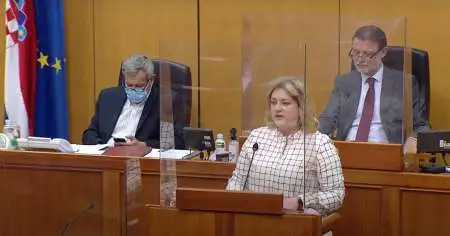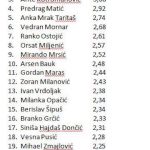More than 30 civilians were killed during, and in the aftermath of Operation Storm in the hamlets of Plavno, including infirm and elderly people, Šimpraga said, noting that the injustice and evil done to local Croats in the early 1990s cannot and must not be used as justification for any crime.
“Prosecution of war crimes is not just about the truth, justice, and satisfaction for the victims’ families, it is a test of maturity for us and our state which needs to show that it means it when it says that there is no statute of limitations on war crimes, that all victims are the same and all people equal,” she said.
The pain of the families who have lost their dearest ones grows with every unjust court decision, every administrative obstacle to their return, and every outburst of hate towards Serbs, she said.
“Justice has not been served yet, and the vow of silence is stronger than honour and truth,” she warned, adding that 27 years since Operation Storm, crimes against civilians had still not been prosecuted.
Only a few indictments for war crimes against Serbs were issued, and the trials resulted in only two convictions, for the crimes at Prokljan and Mandići and for the crime at Kijane near Gračac, she said.
History cannot be changed, and dead people cannot be brought back to life, but life can be brought back to abandoned villages, Šimpraga said, expressing hope that concrete work on revitalising Grubori would begin soon.
In her address, the Deputy PM also spoke about the Croat civilians killed in Škabrnja and other villages in the early 1990s.
MP and Serb National Council (SNV) president Milorad Pupovac said that the killing of Serb civilians during and in the aftermath of Operation Storm in Lika, Dalmacija, Kordun, and Banija should not be used by anyone to spread hate but that it also should not be negated and moral responsibility for it denied.
Speaking of the Grubori atrocity, he said that despite promises made to the UN, local civil and police authorities did not investigate the case or protect the scene of the crime.
Croatian courts and the Hague war crimes tribunal determined that the crime had been committed and that it had been committed by members of the Lučko Anti-Terrorist Unit; however, the trial ended with an acquittal due to lack of evidence, Pupovac said.
He noted that two years ago, a significant step forward had been made towards post-war reconciliation and better Croatian-Serbian relations, but that unresolved war crimes were seriously undermining the progress achieved.
Attending today’s commemoration at Grubori were also Šibenik-Knin County head Marko Jelić and Knin Mayor Marijo Ćaćić.










